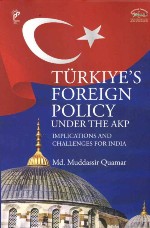You are here
Türkiye’s Foreign Policy Under The AKP: Implications and Challenges for India

About The Book
During the first two decades of the twenty-first century, besides the structural factors namely geography, history, politics, international system and the world order, five conjunctural factors dominated Turkish foreign policy behaviour and conduct. These include the Strategic Depth (Stratejik Derinlik) doctrine with ‘zero-problem’ with neighbours embedded in it followed by the Blue Homeland (Mavi Vatan) doctrine focused on enhancing Türkiye’s maritime presence in its immediate neighbourhood and the periphery. Thirdly, and arguably the most important, is the personality of Recep Tayyip Erdogan who as a dominating figure in contemporary Turkish politics has shaped not only the political discourse but foreign policy praxis. Erdogan’s personalised style of interventions has undoubtedly had a profound impact on Ankara’s interactions and engagements with the wider world. Finally, pan-Islamism and neo-Ottomanism are two important drivers in Turkish foreign policy and were visible notably in the Middle East and North Africa region and came into prominence in the wake of the Arab Spring uprisings. In this context, it is pertinent to ask what are Turkish foreign policy ambitions and how do these impact India? Given that Ankara has expanded its presence, or at least is striving to expand it, in the geographically contiguous Southwest Asia region that connects India to the Middle East, the question how Indian foreign policy should view Türkiye becomes even more important. The bilateral challenges between India and Türkiye make it even more pertinent for Indian scholars and policymakers to take a deep and hard look at Türkiye’s foreign policy doctrines and praxis. This book is an attempt in that direction. It systematically analyses the structural and conjunctural factors in Turkish foreign policy and notes that Türkiye’s foreign policy is embedded in a glorified identification of the past, both Ottoman and Kemalist, and in its geographical location as a multi-regional actor. However, the foreign policy ambitions are limited by Türkiye’s economic performance and political sliding. From an Indian viewpoint, the book identifies Pakistan as a limiting factor so far as the bilateral relations are concerned and recommends that New Delhi should use economic leverage and diplomacy to de-hyphenate the Pakistan factor.
About The Author
Md. Muddassir Quamar is Associate Professor at the Centre for West Asian Studies, School of International Studies in Jawaharlal Nehru University (JNU), New Delhi. Until March 2023, he was Associate Fellow at the Manohar Parrikar Institute for Defence Studies and Analyses (MP-IDSA), New Delhi. Dr. Quamar specialises in Middle East strategic affairs, political Islam, and India’s relations with the region. Among other issues he is interested in society, politics and foreign policy of Saudi Arabia and Türkiye. Dr. Quamar has authored and edited several books, published research articles in reputed academic journals and contributed chapters in edited volumes on contemporary developments in the Middle East. He serves as Associate Editor of the Contemporary Review of the Middle East (Sage, India) and served as Book Review Editor of Strategic Analysis between July 2018 and March 2023. In 2014-15, he was a Visiting Fellow at the King Faisal Centre for Research and Islamic Studies in Riyadh.
Contents
Acknowledgements
- Introduction
Foreign Policy Priorities
Türkiye in the Middle East and South Asia
Implications for India
Definition, Rationale and Structure - The Glorious Past: Ottoman and Kemalist Consciousness The Ottoman Era
Legal Frameworks
Political Structures
Economic and Trade Links
Society and Culture
War and Peace
End of the Empire - The Kemalist Era
Politics and Foreign Policy
Economic and Social Issues
Türkiye and World War II
Conclusion - Discovering the Self in a Bipolar and a Unipolar World Foreign Policy during the Cold War
Determinants
External Relations
Post-Cold War Recalibration
Internal Political Churnings
Impact of the External Environment
Adjusting to Global Politics
Middle Power Aspirations
Conclusion - Breaking the Mould: Foreign Policy in the Twenty-First Century
Domestic Transitions
Determinants of Foreign Policy under the AKP
Strategic Depth
The Blue Homeland
Erdogan’s Personality
Pan-Islamism
Neo-Ottomanism
External Relations
Relationship with Traditional Partners
Relations with other Global Powers
Neighbourhood and Beyond
Conclusion
Strategic Overreach: Türkiye and MENA
Incentives for a Change in Approach
Economic Imperatives
Political Aspirations
Systemic and Regional Factors
Improvements in Ties, 2002–10
Syria
Iraq
Egypt
The GCC States
Iran
Israel and Palestinians
Jordan, Lebanon and the Maghreb Countries
Arab Spring and Strategic Overreach
Intervention in Syria
Confrontation with Egypt
Involvement in Tunisia
Interference in Libya
Türkiye in Iraq
Challenging Saudi Arabia and Competition with the UAE
Partnership with Qatar
Problems with Iran and Israel
Economic Crisis and Regional Reconciliations
Conclusion - Turkish Foreign Policy and Implications for India
Indo–Turkish Relations
Efforts to Improve Political Contacts
Hope for Improved Relations
Derailment and Heightened Tensions
Commercial Ties
Türkiye–Pakistan Relations
Political Convergence
Islamic Solidarity
Geopolitical Stirrings
Commercial Relations
Security and Defence Cooperation
The Turkish Challenge for India
Bilateral Issues: The Pakistan Factor and Kashmir
Regional and Systemic Challenges
Policy Recommendations for India
Conclusion
Index


